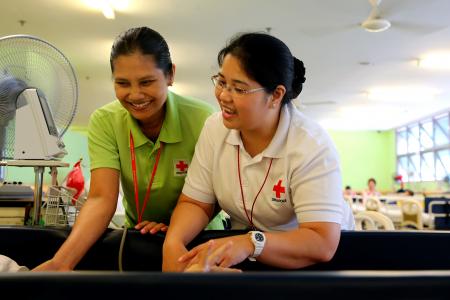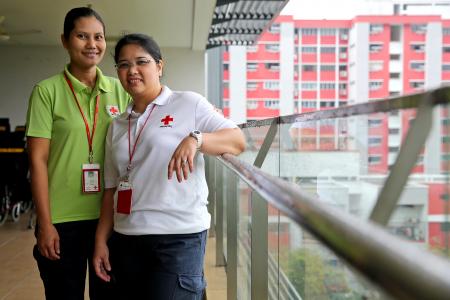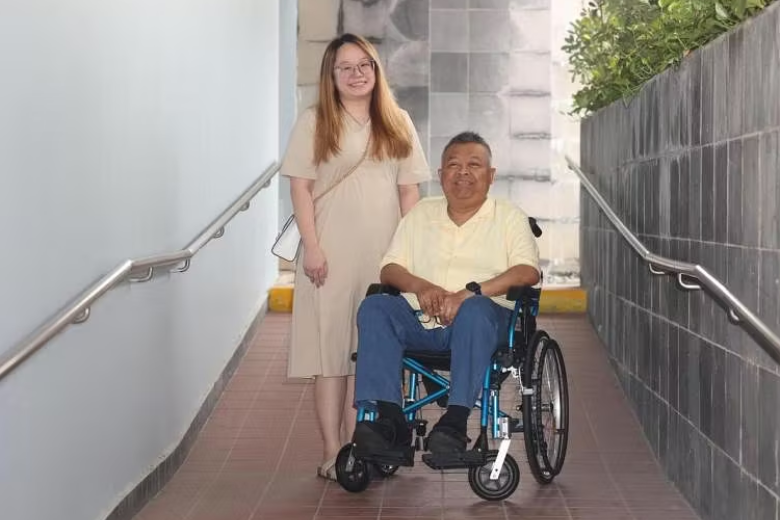Myanmar nurse overcomes language barrier to excel at job
Foreign nurses are now a common sight in nursing homes and hospitals, so Nurses' Day on Aug 1 had extra significance. Two foreign nurses at the Red Cross Home for the Disabled speak to ANG QING (aqing@sph.com.sg) about working here
She had nine years of experience as a nurse in Myanmar, but all that was of little use when she first came to work here.
The reason: Ms Win Myat Myat Myosu's English was so poor when she came to Singapore six years ago that she had trouble dealing with the residents at the Red Cross Home for the Disabled (RCHD).
The 39-year-old nursing aide said: "I didn't understand (the) residents' requests when I fed them."
She recalled an incident when she first started work in 2009 at RCHD, which has 101 residents aged six to 67 with multiple disabilities.
A 56-year-old woman got angry when Ms Myosu did not understand that she was asking for coffee, so she shouted at the nurse and scolded her.
Ms Myosu had to constantly ask her colleagues at the home to translate what the residents wanted.
Determined to overcome the language barrier, she attended weekly English classes conducted at RCHD by volunteers. She also tried to actively speak with the residents and take note of their behavioural quirks.
Ms Myosu said: "Once, when I was on night duty, I asked the resident who wanted coffee to speak slowly so that I could understand what she was saying and she said 'okay', and then both of us said 'okay'.
"Now she says 'Hey, Miss Okay' whenever she sees me."
Ms Myosu's communicating skills have improved so much that the residents who were initially upset with her are now her friends, said Mr Sudirman Othman, 35, nurse manager at RCHD.
In fact, it was Ms Myosu's keen observation skills which helped a boy who was using a wheelchair to eventually start walking.
When the 12-year-old first arrived at RCHD in 2012, he was very thin and weak, said Ms Myosu, who is married but does not have any children.
The child, who had behavioural problems, would also often hit her.
She said: "He was very aggressive and always cried. He would hit me. He was very hard to take care of and understand."
Like most residents at the home, he could only communicate with simple sounds and hand gestures.
Last year, during one of Ms Myosu's shifts, she noticed the boy flapping his hands and alerted the staff nurse in charge.
She said: "I said, 'Madam, I think he wants to walk'."
They placed the boy on the ground and he started to crawl. Her eyes lit up as she described how the boy, who is now 15, could walk after going for physiotherapy.
Even though work can be difficult when residents get aggressive, Ms Myosu enjoys her time with them.
She said: "I am happy when they are happy."
She wishes patients here have more family support
To Ms Cherilyn Austria Imson, the patients under her care are like family.
Which is why she is feels sad that there is so little family support for patients in Singapore compared to the Philippines.
The 39-year-old Filipino nurse said that about half of the 101 residents at the Red Cross Home for the Disabled (RCHD) do not have family members visiting them.
Ms Imson said: "I pity them because although they have families, (their families don't) come regularly. For half of them, I haven't seen their families, especially those who are violent.
"(For some, it's) because they are old, for others (it's because) their relatives are uncontactable."
A cardiac nurse in the Philippines for eight years, she has worked at the National University Hospital (NUH) and at another home, before joining RCHD. She has been working in Singapore for a total of three-and-a-half years.
Work is often the reason why family members can't look after the patients the whole day, Ms Imson said, based on her year's experience caring for patients at NUH.
She said: "They are always working so they have no time to visit, and they are dependent on the nurses to care for the patients.
"Because they are working, we update them on the status of the patient every three days.
"(But) if we call, they will come down to care for the patients."
Ms Imson, whose husband is a printing supervisor in the Philippines, hopes to bring her two children - a girl, 12, and a boy, 8 - to Singapore for a vacation.
Although she misses her family, work keeps her occupied.
She said: "I consider spending time with the residents as if I'm together with my family members and friends. One 18-year-old girl is like my daughter."
Get The New Paper on your phone with the free TNP app. Download from the Apple App Store or Google Play Store now





